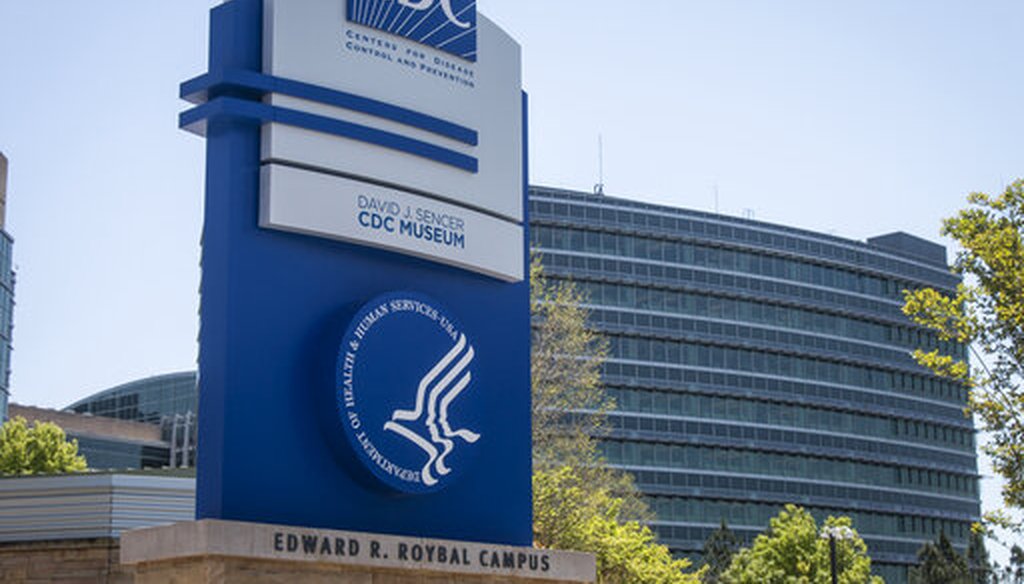



A sign at the entrance to the Centers for Disease Control and Prevention on April 19, 2022, in Atlanta. (AP)
The U.S. did not support deadly pathogen research at a lab under siege in Sudan.
U.S. agencies have supported public health efforts in South Sudan, including lab infrastructure and staffing.
South Sudan won independence from Sudan in 2011.
A scientific laboratory’s takeover amid violent conflict in Sudan has prompted warnings that there are dangerous materials there, including samples of polio, measles and cholera. It has also prompted false claims that the United States government and Dr. Anthony Fauci financially supported dangerous research at the lab.
"Report: CDC, DoD, Fauci funded Sudan biolab seized by militants," read a headline shared in a TikTok video posted around April 27. That headline came from a story in World Tribune, a website that shares far-right content, that credited a story on the War Room, a website affiliated with the far-right podcaster and former Trump administration adviser Steve Bannon.
TikTok identified videos like this as part of its efforts to counter inauthentic, misleading or false content. (Read more about PolitiFact’s partnership with TikTok.)
In an April 26 post, War Room wrote that documents show that the U.S. Centers for Disease Control and Prevention, the U.S. Defense Department and Fauci, former director of the National Institute of Allergy and Infectious Diseases, "funded deadly pathogen research" at a Sudanese biolab seized by militants. But the story confused a lab in Juba, South Sudan, with the besieged lab in Khartoum, Sudan.
South Sudan gained independence from Sudan in 2011.
The War Room post claimed that a document from CDC proves the agency was involved in dangerous research. But the document describes the CDC’s work in South Sudan, at a national laboratory in Juba, about 740 miles away from the Sudan National Public Health Laboratory in Khartoum.
CDC spokeswoman Belsie González told PolitiFact that the CDC was not involved in the Khartoum lab. The CDC’s work in South Sudan involves infrastructure and staffing for the national lab, along with efforts to stop the spread of HIV.
War Room made the same error when it tried to link Fauci and the National Institutes of Health with the Khartoum lab. It cited a research paper and wrote that one of the contributors was from Sudan and was supported by the NIH. But the author, Lul O. Deng, was from the National Public Health Laboratory in Juba, South Sudan. None of the paper’s other authors are from the Khartoum lab.
The research used dried blood spots instead of venous blood draws to detect bacteria that cause cholera. Like other African nations, South Sudan has experienced severe cholera outbreaks.
In Sudan, the conflict between Sudanese Armed Forces and the country’s Rapid Support Forces paramilitary group continues. The Sudan national laboratory’s security is important because the lab has samples of infectious diseases.
Dr. Nima Saeed Abid, the WHO’s representative in Sudan, said that one side in the conflict had seized control of the central public health laboratory in Khartoum and "kicked out all of the technicians," The Associated Press reported.
The situation is dangerous because there are polio isolates, measles isolates and cholera isolates in the lab, Abid said.
The WHO tweeted April 28 that the lab’s occupation creates a "moderate risk" to public health, and that its "main concern is that untrained individuals could mishandle infectious specimens, infecting themselves & potentially others."
War Room did not reply to a request for evidence for its claim.
Citing a headline from a story on War Room, a TikTok video claimed that U.S. government agencies funded "deadly pathogen research" at a lab under siege in Sudan.
But the activities War Room’s story cited concerned a laboratory in Juba, South Sudan, about 740 miles away from the lab in Khartoum, Sudan, which had been taken over during a military conflict.
U.S. agencies supported such things as laboratory infrastructure and staffing, as well as finding novel ways to detect cholera in a community.
Besides mixing up the labs, the website also misled about the work being done in South Sudan.
We rate this claim False.
The Associated Press, "UN warns of lab risk, more displacement amid Sudan conflict," April 25, 2023.
CBS News, "Sudan fighting brings ‘huge biological risk’ as lab holding samples of deadly diseases occupied, WHO warns," April 25, 2023.
CNN, "WHO warns of ‘biological risk’ after Sudan fighters seize lab, as violence mars US-brokered ceasefire," April 26, 2023.
War Room with Stephen Bannon, "EXC: Fauci, DOD, & CDC Funded Deadly Pathogen Research At Sudanese Biolab Seized By Militants," April 26, 2023.
TikTok video, user wgospodinov2, around April 27, 2023.
Twitter, tweet, @WHOERMO, WHO Eastern Mediterranean Regional Office, April 28, 2023.
Email interview, Belsie González, senior public affairs specialist, Division of Media Relations, Centers for Disease Control and Prevention, May 1, 2023.
PLOS Neglected Tropical Diseases, "Dried Blood Spots for Measuring Vibrio cholerae-specific Immune Responses," Jan. 29. 2018.
U.S. Centers for Disease Control and Prevention, fact-sheet, "CDC in South Sudan," undated.
In a world of wild talk and fake news, help us stand up for the facts.
